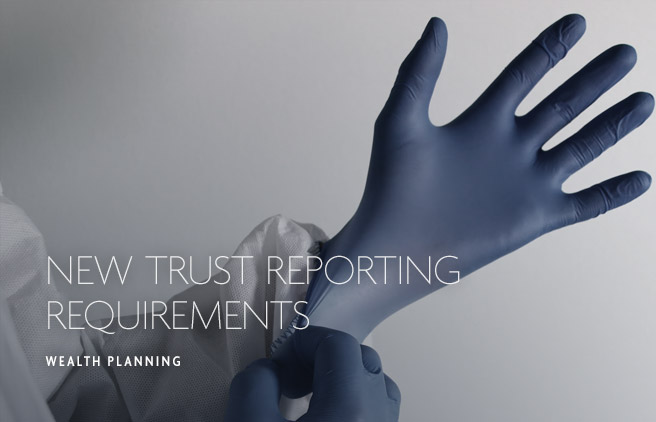
Navigating the New Trust Reporting Requirements in Canada
New rules aimed at providing more transparency on beneficial ownership of assets now require that more trusts (and estates) file tax returns. These changes will catch many individuals and businesses that may not be aware of their trust-like relationships, exposing them to potential penalties and other consequences for non-compliance. The rules become effective in 2023, with a filing deadline of April 2, 2024.
Understanding the New Landscape: The rules have been expanded to include cases where a trust acts as an agent for its beneficiaries, commonly known as a bare trust. In such instances, the person/entity listed as the owner of an asset is not the true beneficial owner; instead, they hold the asset on behalf of another party.
Who Needs to Pay Attention?
- Express Trusts: This includes a wide array of trusts, from family trusts used for estate planning to investment trusts designed for managing assets.
- Bare Trusts: Often overlooked in the past, these trusts are now under scrutiny. If you’re involved in an arrangement where one party holds legal title to an asset for the benefit of another, you’re likely dealing with a bare trust and now face greater scrutiny.
Key Reporting Changes: The changes are not just about who needs to report but also about what information needs to be reported:
- Expanded Reporting Requirements: Information about all trustees, beneficiaries, and settlors, including personal details like names, addresses, birthdates, and tax identification numbers, is now required.
- Increased Transparency for Bare Trusts: The CRA is particularly interested in arrangements that may have been previously underreported, such as those involving real estate or other significant assets.
Scenarios to Watch Out For: Understanding common situations that might now require reporting can help prevent inadvertent non-compliance:
- Real Estate Investments: a parent is on title of a child’s home (without the parent having beneficial ownership) to assist the child in obtaining a mortgage OR where one spouse is on title of a house or asset although the other spouse is at least a partial beneficial owner;
- Joint Bank Accounts: a parent or grandparent holds an investment or bank account in trust for a child or grandchild;
- Estate Planning Reasons: a child is on title of a parent’s home (without the child having beneficial ownership) for probate or estate planning purposes only OR a child is on parent’s financial accounts (or other assets) to assist with administration after the parent’s passing;
- Business Administration Reasons: a corporate bank account is opened by the shareholders with the corporation being the beneficial owner of the funds OR a corporation is on title of an individual’s real estate, vehicle or other asset, and vice-versa OR assets registered to one corporation but beneficially owned by a related corporation OR use of a nominee corporation for real estate development purposes OR a partner of a partnership holding a bank account or asset for the benefit of all the other partners of a partnership;
Not every trust is impacted. There are notable exceptions, such as:
- New trusts that have been in existence for less than three months
- Trusts holding less than $50,000 of assets in certain categories
- Trusts that serve specific functions, like those operated by charities or used by a law office
Ensuring Compliance: Navigating these changes requires a proactive approach:
- Assessment and Review: Evaluate your trust arrangements to determine if and how the new rules apply.
- Information Gathering: Collect and organize the required information for each party involved in your trust.
- Professional Advice: Given the complexities, consulting with a tax professional or legal advisor is advisable to ensure full compliance.
- Completing the Filing: Bare trusts now are mandated to file a T3 Trust Income Tax and Information Return, regardless of the asset value.
Mitigating Risks of Non-Compliance: Failure to make the required filings and disclosures on time attracts penalties of $25/day, to a maximum of $2,500, as well as further penalties on any unpaid taxes. New gross negligence penalties may also apply, being the greater of $2,500 and 5% of the highest total fair market value of the trust’s property at any time in the year. These will apply to any person or partnership subject to the new regime.
CRA has recently indicated that, for bare trusts only, the late filing penalty would be waived for the 2023 tax year in situations where the filing is made after the due date of April 2, 2024. However, CRA noted that this does not extend to the penalty applicable where the failure to file is made knowingly or due to gross negligence. As there is limited guidance as to who would qualify, it is recommended that disclosures should be made in a timely manner.
Conclusion: While the new trust reporting requirements in Canada represent a significant shift, they also offer an opportunity for trustees and beneficiaries to review and ensure their arrangements are fully compliant. While these changes can seem daunting and potentially even invasive, it’s important to stay on the right side of the change by staying informed and seeking professional guidance to simplify the process.
FAQs:
- What triggers the need for a trust to report under the new rules? Any trust that falls under the definition of an express trust or bare trust, with certain exceptions, will need to comply with the new reporting standards.
- What are the consequences of non-compliance? Penalties can include monetary fines and accumulative penalties and, in some cases, more severe legal repercussions. Ensuring accurate and timely reporting is crucial.
New rules aimed at providing more transparency on beneficial ownership of assets now require that more trusts (and estates) file tax returns. These changes will catch many individuals and businesses that may not be aware of their trust-like relationships, exposing them to potential penalties and other consequences for non-compliance. The rules become effective in 2023, with a filing deadline of April 2, 2024.
Understanding the New Landscape: The rules have been expanded to include cases where a trust acts as an agent for its beneficiaries, commonly known as a bare trust. In such instances, the person/entity listed as the owner of an asset is not the true beneficial owner; instead, they hold the asset on behalf of another party.
Who Needs to Pay Attention?
- Express Trusts: This includes a wide array of trusts, from family trusts used for estate planning to investment trusts designed for managing assets.
- Bare Trusts: Often overlooked in the past, these trusts are now under scrutiny. If you’re involved in an arrangement where one party holds legal title to an asset for the benefit of another, you’re likely dealing with a bare trust and now face greater scrutiny.
Key Reporting Changes: The changes are not just about who needs to report but also about what information needs to be reported:
- Expanded Reporting Requirements: Information about all trustees, beneficiaries, and settlors, including personal details like names, addresses, birthdates, and tax identification numbers, is now required.
- Increased Transparency for Bare Trusts: The CRA is particularly interested in arrangements that may have been previously underreported, such as those involving real estate or other significant assets.
Scenarios to Watch Out For: Understanding common situations that might now require reporting can help prevent inadvertent non-compliance:
- Real Estate Investments: a parent is on title of a child’s home (without the parent having beneficial ownership) to assist the child in obtaining a mortgage OR where one spouse is on title of a house or asset although the other spouse is at least a partial beneficial owner;
- Joint Bank Accounts: a parent or grandparent holds an investment or bank account in trust for a child or grandchild;
- Estate Planning Reasons: a child is on title of a parent’s home (without the child having beneficial ownership) for probate or estate planning purposes only OR a child is on parent’s financial accounts (or other assets) to assist with administration after the parent’s passing;
- Business Administration Reasons: a corporate bank account is opened by the shareholders with the corporation being the beneficial owner of the funds OR a corporation is on title of an individual’s real estate, vehicle or other asset, and vice-versa OR assets registered to one corporation but beneficially owned by a related corporation OR use of a nominee corporation for real estate development purposes OR a partner of a partnership holding a bank account or asset for the benefit of all the other partners of a partnership;
Not every trust is impacted. There are notable exceptions, such as:
- New trusts that have been in existence for less than three months
- Trusts holding less than $50,000 of assets in certain categories
- Trusts that serve specific functions, like those operated by charities or used by a law office
Ensuring Compliance: Navigating these changes requires a proactive approach:
- Assessment and Review: Evaluate your trust arrangements to determine if and how the new rules apply.
- Information Gathering: Collect and organize the required information for each party involved in your trust.
- Professional Advice: Given the complexities, consulting with a tax professional or legal advisor is advisable to ensure full compliance.
- Completing the Filing: Bare trusts now are mandated to file a T3 Trust Income Tax and Information Return, regardless of the asset value.
Mitigating Risks of Non-Compliance: Failure to make the required filings and disclosures on time attracts penalties of $25/day, to a maximum of $2,500, as well as further penalties on any unpaid taxes. New gross negligence penalties may also apply, being the greater of $2,500 and 5% of the highest total fair market value of the trust’s property at any time in the year. These will apply to any person or partnership subject to the new regime.
CRA has recently indicated that, for bare trusts only, the late filing penalty would be waived for the 2023 tax year in situations where the filing is made after the due date of April 2, 2024. However, CRA noted that this does not extend to the penalty applicable where the failure to file is made knowingly or due to gross negligence. As there is limited guidance as to who would qualify, it is recommended that disclosures should be made in a timely manner.
Conclusion: While the new trust reporting requirements in Canada represent a significant shift, they also offer an opportunity for trustees and beneficiaries to review and ensure their arrangements are fully compliant. While these changes can seem daunting and potentially even invasive, it’s important to stay on the right side of the change by staying informed and seeking professional guidance to simplify the process.
FAQs:
- What triggers the need for a trust to report under the new rules? Any trust that falls under the definition of an express trust or bare trust, with certain exceptions, will need to comply with the new reporting standards.
- What are the consequences of non-compliance? Penalties can include monetary fines and accumulative penalties and, in some cases, more severe legal repercussions. Ensuring accurate and timely reporting is crucial.





